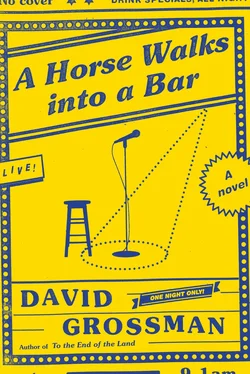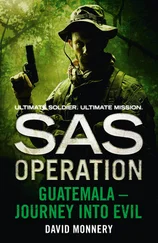The murmur dies down. The kitchen din stops, too. There is a deep silence, like the flash of nothingness before a huge rupture. Dovaleh is so immersed in the story that he apparently doesn’t notice something simmering, and I’m afraid someone will actually hurt him, throw a glass or a bottle or even a chair at him. Anything could happen now. He stands downstage, too close to the audience, his arms hugging his narrow chest, a distant, transparent smile caressing his face: “Every single evening I’d sit there next to Mom with her needle and nylons and do my homework and watch him use the saw. I remember the way he moved, and how his eyes got rounder and blacker, until he looked up and gazed at Mom and within a second he’d come back from wherever he’d been, back to being a human being, and there’s Mom, hey Mom, look, Netanya…”
All at once, the club erupts. People stand up. Chairs are pushed back, an ashtray drops to the floor with a clang. Mumbles, grumbles, sighs of relief, and then voices roll in from outside that do not belong here, wild laughter, car doors slamming, groaning engines, and screeching tires. Dovaleh trots over to the board, the chalk in his hand flies like a conductor’s baton. Five, eight. Ten. More and more, at least ten tables gone. It wasn’t a coordinated move. Something ripened all at once in people, and they stream out like hurrying refugees, bottlenecking at the door. The man with the thick shoulders who pounded his table before passes by me and grunts at his wife: “Can you believe how he’s using us to work out his hang-ups?” She answers: “Yeah, and what about the lokshen? And don’t forget the used nylons! We got a full-on storytelling circle!”
Three minutes later most of the audience is gone, and the little club with its low ceiling seems to be panting in shock. Those of us still seated watch the last of the departees with a dulled weariness, some condemning, others jealous. But there are a few, not many, who sit up straighter in their chairs and turn back to Dovaleh expectantly, with renewed energy. He himself, his back to the exits, finishes marking the last red lines on the board, which now look like a madman’s doodle. He puts the chalk down and turns to face the sparsely populated club, and to my surprise he looks relieved.
“Remember the driver?” he asks, as if the last few minutes have not occurred at all. He replies on our behalf: “Yeah, we remember. So meanwhile the driver does not stop telling jokes. More and more of them, and I don’t even hear him, I don’t even laugh out of politeness anymore, I can’t do it. But he’s a rock, the performer from hell, nothing can break him, he can have a thousand people walk out of his car in the middle of a drive and he’ll keep on telling jokes. I look at him from the side and see how his face has changed. It’s tough now, dead serious, and he doesn’t turn to me, doesn’t try to catch my eye, just joke after joke after joke. And I’m thinking: What the fuck? What is his problem?
“This whole situation, what can I tell you, the drive, the driver, the drill sergeant who actually used the word ‘orphan,’ which is something that hasn’t even entered my mind yet—hasn’t penetrated at all! Keeps flying off me like a tripped circuit breaker. An orphan is someone who gets old all of a sudden, isn’t it? Or some kind of cripple. An orphan is Eli Stieglitz from the ninth grade, whose dad worked at the Dead Sea factories and a crane fell on him and Eli talked with a stutter ever since. Does that mean I’ll start stuttering, too? What sound does an orphan make? Is there a difference between an orphan without a father and an orphan without a mother?”
His hands are tightened into fists that he holds up in front of his mouth. People lean closer to hear better. There are so few of us. Scattered around the room.
“And believe me, Netanya, I don’t want anything in my life to change. I’ve had things good up to now, the best in the world. Our apartment suddenly seems like heaven, even though it’s small and dark and you can suffocate from the smell of rags and velveteen and all his cooking. I even liked that smell suddenly. Okay, so it sucked ass, and it was a nuthouse, and yes, I got beat up generously, okay, big deal, everyone got hit, so what, who didn’t get hit back then? That’s the way it was in those days! They didn’t know any better! Did it do us any harm? Didn’t we turn out just fine? Didn’t we become human beings?”
His eyes are glazed. He looks as though the events were happening now, right at this minute.
“That’s how families are. One minute they hug you, the next they beat the crap out of you with a belt, and it’s all from love. Spare the rod, spoil the child. ‘Believe me, Dovchu, sometimes a slap is worth a thousand words.’ And there you have my father’s compendium of jokes in its entirety.” He wipes the sweat off his forehead with the back of his hand and attempts a smile. “Where were we, my little chickadees? What’s up with you? You really do look like battered children. You’re making me want to give you a back rub and sing you a lullaby. Did you hear the one about the snail who goes to the police? You didn’t? You didn’t hear this one either?! So the snail walks into a police station and says to the desk sergeant, ‘Two turtles attacked me!’ Desk sergeant opens up a file and says, ‘Describe exactly what happened.’ Snail says, ‘I don’t really remember, it all happened so fast.’ ”
The audience titters cautiously. I do, too. Not just from the joke. The laughter now is mostly an excuse to breathe.
“So listen, my hand is on the door handle this whole time. And the driver, without looking at me, he goes—”
The little woman suddenly squeaks cheerfully. He looks at her: “What happened, medium? Did I start being funny?”
“Yes, the joke with the snail is funny!”
“Really?” His eyes open wide with joy.
“Yes! Because of how he said it all happened so fast…”
He peers at her over his glasses. I know he’s running through possible quips: Anyone ever tell you you’re like a bank safe? You both have a ten-minute delay mechanism…But he just smiles at her and throws his hands up. “You’re one of a kind, Pitz.”
She straightens up, her short neck growing longer: “That’s what you told me.”
“That’s what I told you?”
“Once I was crying, and you came down the street—”
“Why were you crying?”
“ ’Cause they hit me, and you said—”
“Why did they hit you?”
“Because I weren’t growing, and you came behind the house by the gas balloons—”
“On my hands?”
“Of course. And you said I was one of a kind, and that if I cried ’cause of them, then you see it upside down, and it’s like I’m laughing ’cause of me.”
“You still remember that?”
“I have a long memory as compensation,” she explains and nods three times.
“And now for something completely different!” he declares, but his shout is restrained this time, perhaps so as not to startle her. “Suddenly the driver slaps his forehead and goes: ‘I can’t believe what an idiot I am! You’re probably not in the mood for all this joking around now, right? I just wanted to clear your head so you could forget for a while, but I shouldn’t be like this, I’m sorry, okay? Forgive me? No hard feelings?’ So I say, ‘It’s okay.’ Then he says, ‘You should sleep now. I’m done. Not another word out of me all the way to Be’er Sheva. Zip!’ ”
He gives us another reenactment of the drive: his body bobs up and down, bouncing on potholes, leaning right and left with the curves. The passenger’s eyes slowly close, his head droops onto his chest over the bumpy road. Suddenly he startles: “I wasn’t sleeping!” And immediately drips back slowly into sleep. He is subtle and accurate, a master of his art. The small crowd grins: it has been given a gift.
Читать дальше












